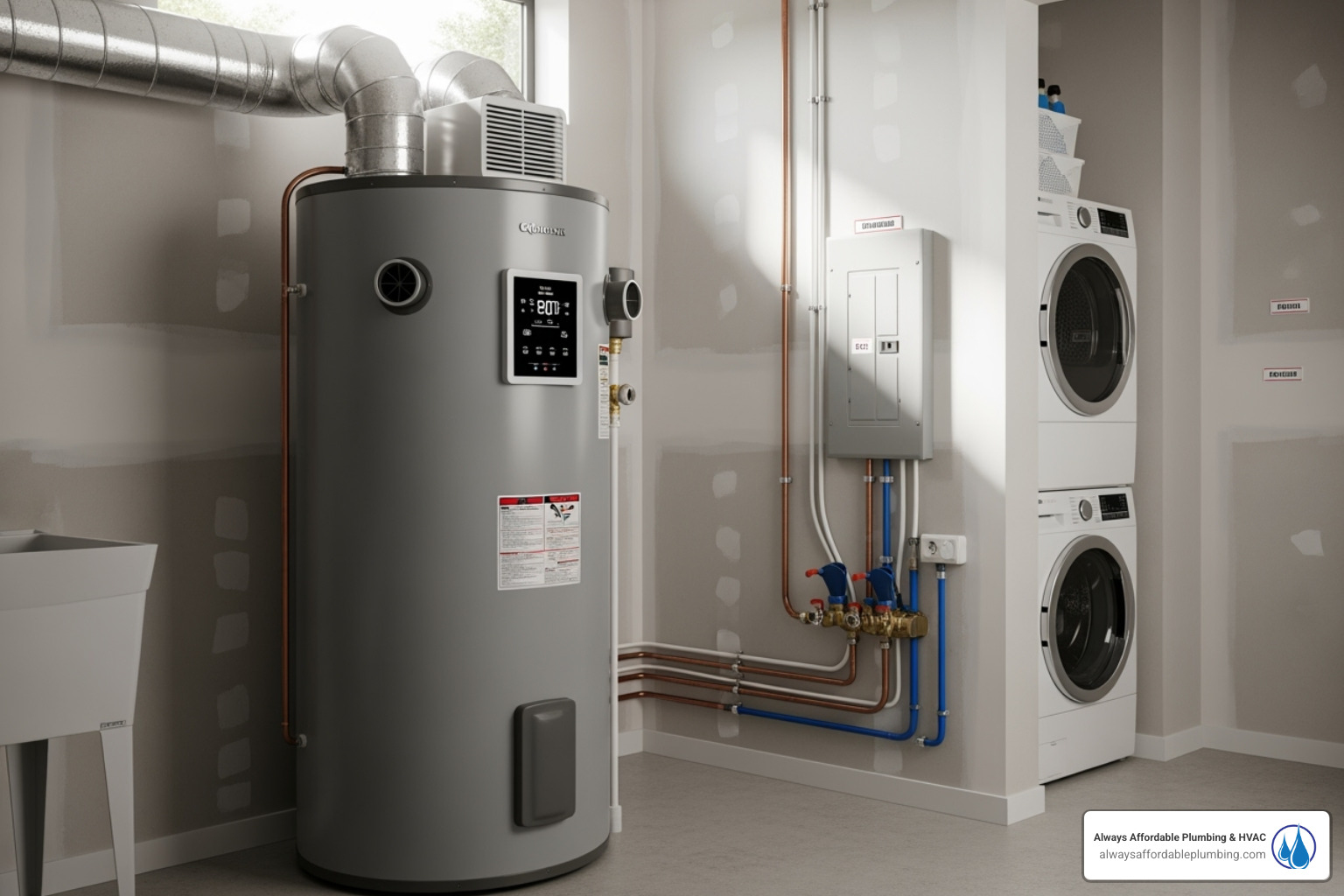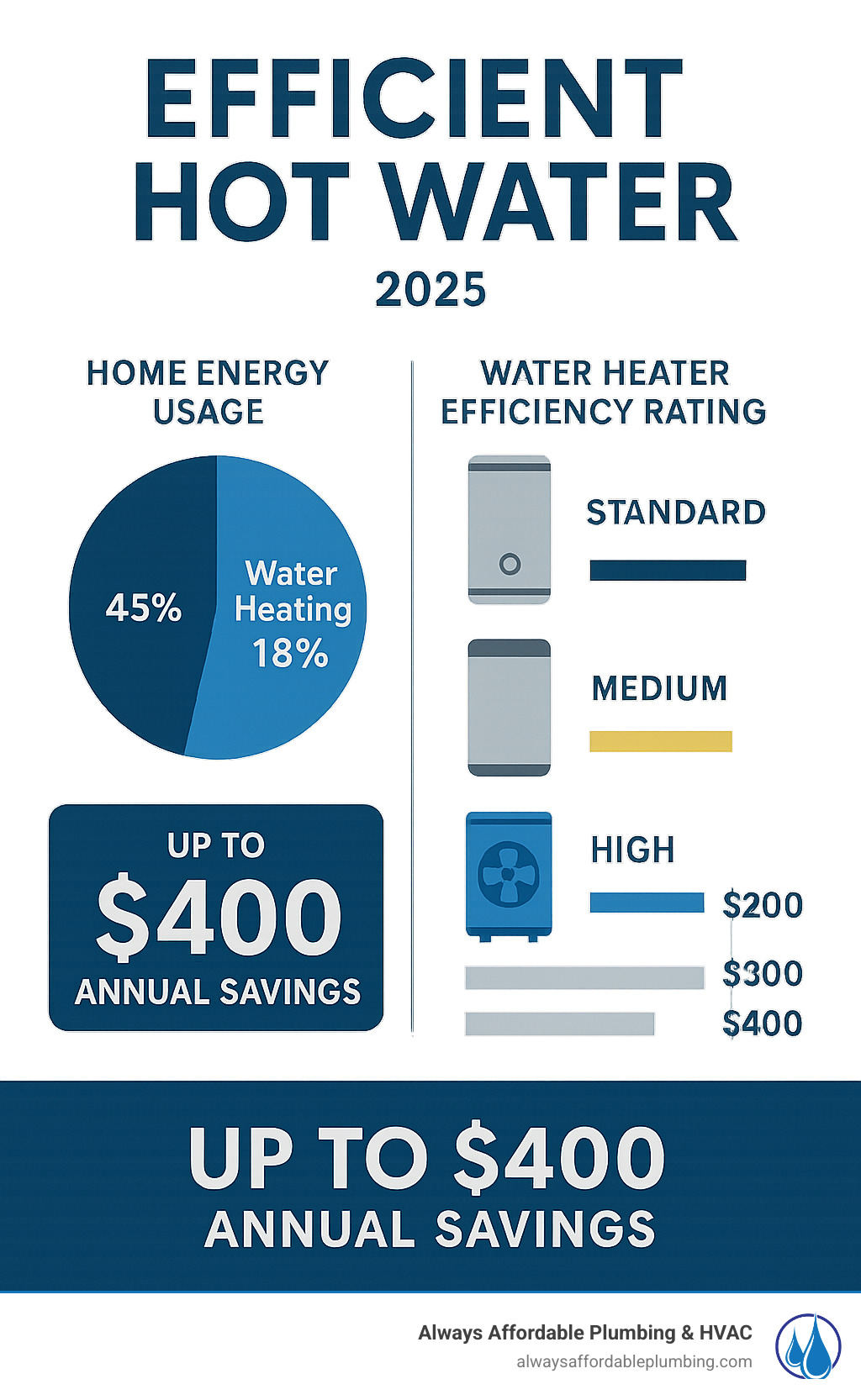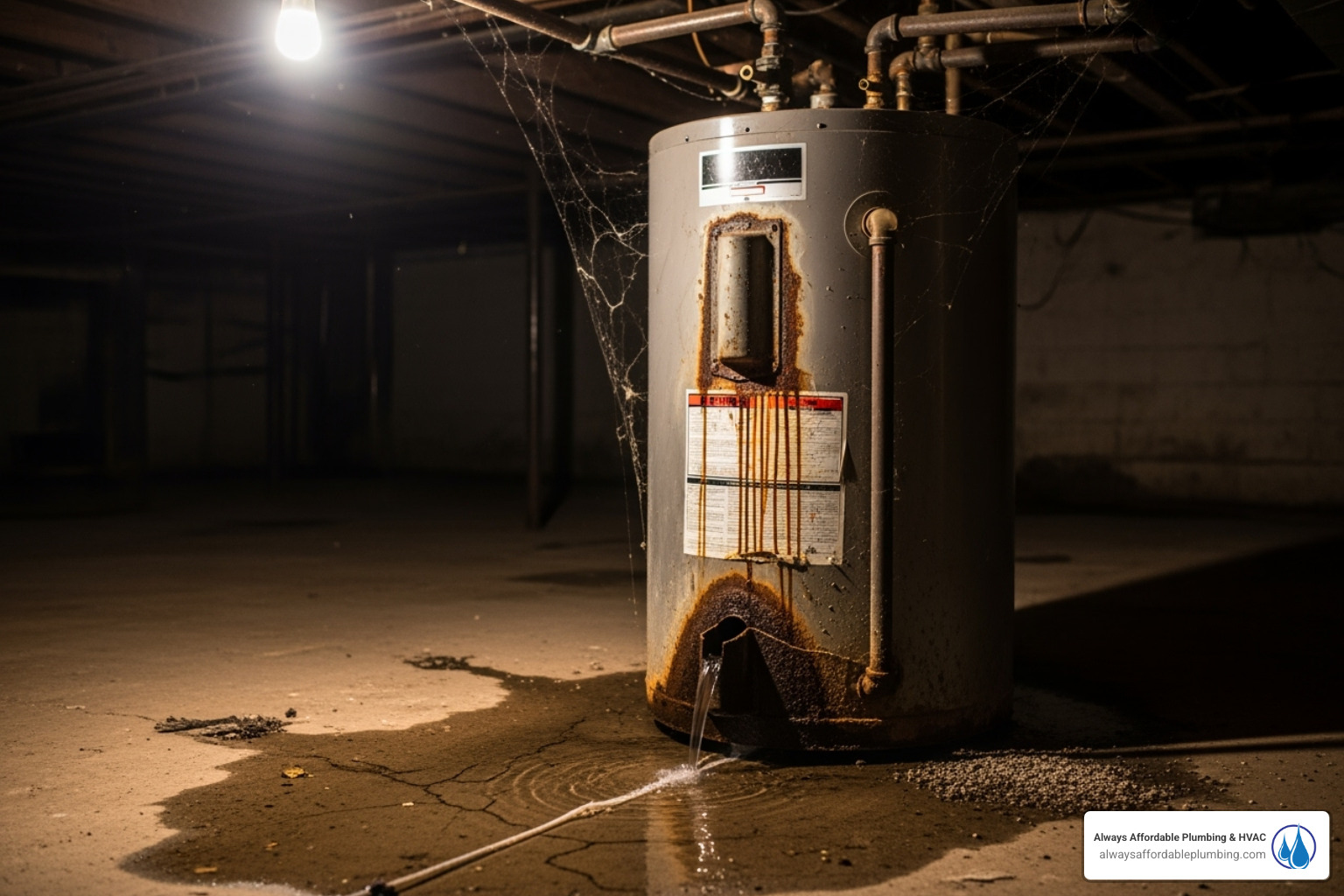
05 Sep Is It Time for an Upgrade? Making Smart Choices for Your Home’s Hot Water
Why Efficient Hot Water Matters for Your Home’s Energy Bill
Efficient hot water systems can dramatically reduce your energy consumption and utility bills. Here’s what you need to know:
Key Benefits of Efficient Hot Water Systems:
- Energy Savings: Heat pump water heaters use about one-quarter of the energy of standard models.
- Cost Reduction: Can save a household of four approximately $600 per year on electric bills.
- Long-term Value: Lifetime savings can exceed $4,500 compared to standard electric water heaters.
- Environmental Impact: Heat pump systems have a 65% reduced carbon footprint vs. conventional gas heaters.
Most Efficient Water Heater Types:
- Heat Pump Water Heaters – Move heat instead of creating it.
- Tankless Water Heaters – Heat water on demand only.
- Solar Water Heaters – Use free solar energy.
- High-Efficiency Storage Tanks – Better insulation and controls.
Water heating is often the second-largest energy expense in a home, accounting for about 18% of total energy costs. The average US household spends $400 to $600 per year just heating water, so choosing the right system is key to significant savings.
Whether your current water heater is old and inefficient or you’re planning a smart upgrade, understanding your options is the first step toward long-term savings and reliable hot water. This guide covers everything from new technology to simple maintenance tips to help you get the most out of your system.
Decoding Water Heater Technology: From Traditional to Cutting-Edge
When it comes to keeping your home supplied with hot water, there’s a wider array of choices than you might think. From the familiar storage tank to advanced solar solutions, each type offers unique benefits. Understanding these differences is key to making an informed decision for truly efficient hot water.
Conventional Storage Tank Heaters
These are the most common water heaters. They use an insulated tank to heat and store a ready reservoir of hot water.
How They Work: Cold water enters the tank and is heated by a gas burner or electric elements. A thermostat maintains the set temperature. When you use hot water, it’s replaced by cold water, which is then heated.
Pros:
- Lower Initial Investment: These systems are generally more affordable upfront.
- Simple Technology: Their straightforward design can mean easier installation and repairs.
- Ready Reservoir: They offer a consistent supply of hot water until the tank is depleted.
Cons:
- Standby Heat Loss: Energy is constantly used to keep the stored water hot, even when you’re not using it.
- Limited Hot Water Supply: Heavy use can deplete the tank, requiring a wait for it to reheat.
- Larger Footprint: The tank requires significant dedicated space.
Lifespan: A typical storage tank water heater lasts 8 to 12 years. If yours is approaching this age, consider an upgrade. For common issues, learn more here: Is My Water Heater Broken?.
Tankless (On-Demand) Water Heaters
Tankless water heaters provide hot water on demand, without a storage tank.
How They Work: When you turn on a hot water faucet, water flows through the unit and is instantly heated by a powerful gas or electric element. This provides a continuous supply of hot water.
Pros:
- Endless Hot Water: A properly sized unit provides a continuous hot water supply.
- Energy Savings: They eliminate standby heat loss, making them highly efficient.
- Space-Saving Design: Their compact size frees up valuable floor space.
- Longer Lifespan: They can last 20 years or more, nearly double that of tank models.
Cons:
- Higher Upfront Cost: The initial purchase and installation cost is higher.
- Flow Rate Limitations: Simultaneous use of multiple fixtures can sometimes overwhelm a single unit if not sized correctly.
Many homeowners in Sacramento and Folsom have switched to tankless systems. Explore the Benefits of a Tankless Water Heater and see if it’s right for you: Do I Need to Switch to a Tankless Water Heater?.
Heat Pump (Hybrid) Water Heaters
Heat pump or “hybrid” water heaters offer incredible energy efficiency by moving heat instead of creating it.
How They Work: A heat pump works like a refrigerator in reverse. It pulls heat from the surrounding air and transfers it to the water in the storage tank. Because it moves existing heat, it’s remarkably efficient. Most units have backup electric elements for periods of high demand.
Pros:
- Super-Efficient: An ENERGY STAR certified model uses about a quarter of the energy of a standard electric heater.
- Significant Long-Term Savings: Can save a household of four over $4,500 in its lifetime.
- Reduced Carbon Footprint: They have a 65% smaller carbon footprint than conventional gas heaters.
Cons:
- Higher Upfront Cost: The initial investment is higher, but energy savings often lead to a quick payback.
- Installation Considerations: They need adequate air space (a basement or garage is ideal), a drain for condensate, and operate best in temperatures above 38°F (3°C).
For homeowners focused on energy savings and environmental impact, heat pump water heaters are a top choice. Find certified products here: Find certified products using the ENERGY STAR Product Finder.
Solar Water Heaters
Solar water heaters use the sun’s energy, offering a truly sustainable solution for efficient hot water.
How They Work: Collectors on your roof absorb solar energy and transfer it to a fluid, which then heats the water in a storage tank. A conventional backup system is included for cloudy days.
Pros:
- Lowest Operating Cost: Sunlight is free, leading to minimal ongoing energy bills.
- Eco-Friendly: They significantly reduce your carbon footprint.
- Long Lifespan: These systems are durable and can last for many years.
Cons:
- High Initial Investment: They have the highest upfront cost of all water heater types.
- Weather Dependent: Performance relies on sunlight, so a backup system is necessary.
- Payback Period: The time to recoup the initial investment can be substantial, sometimes 10 to 30 years. More info here: The payback period can be 10 to 30 years.
- Installation Complexity: Installation is more involved due to roof-mounted collectors.
Your Blueprint for Truly Efficient Hot Water
Now that you know the different types of water heaters, let’s tailor that knowledge to your home. Creating a system that fits your family’s needs is the key to saving energy and ensuring comfort. This is your blueprint for truly efficient hot water.
Sizing Your System Correctly
Choosing the right size water heater is crucial. Too small, and you’ll run out of hot water. Too large, and you’ll waste energy.
For storage tank heaters, the key metric is the First Hour Rating (FHR), which indicates how many gallons of hot water the unit can supply in an hour of peak usage. We consider:
- Household Size: A family of five needs more hot water than a single person.
- Number of Bathrooms: More bathrooms can mean higher simultaneous demand.
- Peak Demand: We help you identify your busiest hot water usage times to ensure your system can keep up.
For tankless water heaters, we focus on Gallons Per Minute (GPM). This measures how much hot water the unit can produce. We consider:
- Simultaneous Usage: How many showers, sinks, or appliances might run at once?
- Groundwater Temperature: Colder incoming water requires more heating power, affecting the GPM output.
By analyzing your habits, we can recommend a system that delivers the hot water you need without waste. For more tips, see our guide: New Hot Water Heater Best Solano Plumber Tips.
Fuel Types and Their Impact on Efficient Hot Water
The fuel source for your water heater—natural gas, propane, or electricity—significantly affects operating costs and efficiency.
- Natural Gas: Often the most budget-friendly fuel for heating water, it’s a common choice for both tank and tankless models. Requires a gas line and proper ventilation.
- Propane: A great alternative if you don’t have a natural gas line. It performs similarly but requires a storage tank on your property.
- Electricity: Widely available and generally easier to install, as it doesn’t require venting. A standard electric heater can be more expensive to run, but heat pump water heaters use electricity with incredible efficiency, drastically cutting operating costs.
It’s wise to compare local fuel costs. The average U.S. household spends $400 to $600 annually on water heating, and your fuel choice can greatly influence this number. Learn more here: The average US household spends $400 to $600 per year on heating water.
The ENERGY STAR® Advantage for Efficient Hot Water
When shopping, look for the ENERGY STAR® symbol. This label is a promise of verified energy efficiency.
An ENERGY STAR certified water heater uses less energy than a standard model, which translates directly to savings on your utility bills. For example, a certified electric water heater can save a family of four around $600 annually. Over the unit’s lifetime, that can add up to $4,500 or more. Choosing ENERGY STAR is also better for the environment. Learn more about the benefits here: Look for one with the ENERGY STAR® symbol.
Finding Rebates and Incentives
Switching to an efficient hot water system can be more affordable thanks to various rebates and incentives. These programs help offset the upfront cost of energy-saving technology.
- Federal Tax Credits: The U.S. government often offers tax credits for eligible energy-efficient home improvements, including certain heat pump water heaters.
- State and Local Programs: Many states and communities have their own incentive programs.
- Utility Rebates: Local utility providers, like SMUD in Sacramento, frequently offer rebates for upgrading to energy-efficient appliances.
We stay current on all available incentives for homeowners in Sacramento, Elk Grove, and Roseville. We can help you steer these opportunities, like the SMUD Water Heater Rebate, to make your upgrade as affordable as possible.
Smart Habits and Maintenance for Lasting Efficiency
Even with the best water heater, your daily habits and regular maintenance are crucial for ensuring efficient hot water and a long system life.
Reducing Your Hot Water Consumption
The easiest way to save is to use less hot water. These simple tips can make a big difference:
- Shorter Showers: Install a low-flow shower head to reduce water use without sacrificing comfort.
- Cold Water Laundry: Modern detergents work well in cold water, saving energy and water.
- Full Loads: Only run your dishwasher and washing machine when they are full to maximize efficiency.
- Repair Leaks Promptly: A single hot water leak can waste hundreds of gallons per month.
- Consider Drain Water Heat Recovery: These systems capture heat from warm drain water to preheat incoming cold water, cutting water-heating costs by 20% to 40%.
Essential Water Heater Maintenance
Regular upkeep keeps your water heater running at its best, ensuring efficient hot water and extending its lifespan.
- Flushing the Tank: Annually flushing the tank removes sediment buildup, which improves efficiency and prevents damage. Learn how here: How to Flush Your Water Heater.
- Checking the Anode Rod: This rod corrodes to protect the tank. Check it regularly and replace it when needed to prevent tank failure.
- Optimal Temperature Setting: Set your water heater to 120°F (49°C). This is hot enough for most needs, reduces energy use, and helps prevent scalding.
- Insulation: Insulating the tank and hot water pipes, especially in unheated areas like a garage, prevents heat loss and improves efficiency.
- Professional Inspection: A professional inspection every few years can catch potential issues before they become major problems, ensuring your system operates safely and efficiently.
Is It Time to Replace? Key Warning Signs
Knowing the signs of a failing water heater can help you plan a replacement instead of reacting to an emergency. A proactive replacement allows you time to choose the best efficient hot water solution for your home.
Watch for these common warning signs:
Age: Traditional tank water heaters last 8-12 years, while tankless models can last 20 years or more. If your unit is nearing the end of its expected lifespan, it’s wise to start planning for a replacement.
Leaks or moisture: Any water pooling around the base of your tank likely indicates an internal crack or corrosion. A leaking tank almost always requires a full replacement. If you see a leak in Folsom, act fast: Water Heater Leaking in Folsom, CA.
Rusty water: If hot water from your taps is discolored, it’s a sign that the inside of your tank is corroding. Tank failure is likely imminent.
Strange noises: Rumbling or popping sounds often mean there’s significant sediment buildup inside the tank. This forces the heater to work harder, reduces efficiency, and can cause damage.
Running out of hot water: If your showers are getting colder faster or temperatures are inconsistent, your heater’s heating elements could be failing or its capacity may no longer meet your family’s needs.
Frequent repairs: If you’re constantly calling for repairs, investing in a new, reliable, and efficient system is often more cost-effective in the long run.
Recognizing these Signs Home Water Heater is Failing can save you from the headache of an unexpected breakdown.
Frequently Asked Questions About Water Heaters
It’s normal to have questions when considering your home’s hot water system. Here are answers to some common inquiries we receive from homeowners seeking efficient hot water solutions.
How do heat pump water heaters work and why are they so efficient?
Heat pump water heaters don’t create heat; they move it. They work like a refrigerator in reverse, pulling heat from the surrounding air and transferring it to the water in the tank. This process uses far less energy than traditional electric resistance heating, which is why an ENERGY STAR certified heat pump model can use about one-quarter of the energy of a standard unit. This efficiency leads to significant bill savings and a smaller carbon footprint.
What are the main differences in performance between a tank and a tankless water heater?
The primary difference is how they supply hot water.
-
Tank Water Heaters store a ready supply of hot water (e.g., 40-80 gallons). They provide a large amount of hot water at once but can run out during heavy use and must reheat. They also experience “standby heat loss” by constantly keeping water hot.
-
Tankless Water Heaters heat water instantly as you need it. They provide an endless supply of hot water and are more energy-efficient because there’s no standby loss. However, their flow rate can be limited if too many fixtures are used simultaneously.
Essentially, a tank offers a large but finite reservoir, while a tankless unit provides a continuous but flow-rate-limited stream.
How do I know what size water heater I need for my home?
Choosing the right size is key for comfort and efficient hot water. A unit that’s too small will leave you with cold showers, while one that’s too big wastes energy. We consider:
- Household Size: More people require more hot water capacity.
- 1-2 people: A 30-40 gallon tank or a tankless unit with 2-3 GPM is often sufficient.
- 3-4 people: Consider a 40-50 gallon tank or a tankless unit with 4-6 GPM.
- 5+ people: An 50-80 gallon tank or a tankless unit with 6+ GPM is usually recommended.
- Peak Demand: We analyze your family’s habits, like simultaneous showers or appliance use, to determine the peak hot water demand your heater must meet.
For tank heaters, we use the “First Hour Rating” (FHR), and for tankless, we use “Gallons Per Minute” (GPM). A professional assessment is the best way to determine the perfect size for your Sacramento home.
Make the Smart Choice for Your Sacramento Home
After exploring water heater technology, sizing, and maintenance, you’re now equipped to make an informed decision for your home. Upgrading your system is a smart investment in your comfort, energy savings, and a more eco-friendly household.
You’ve learned how different systems work, the importance of correct sizing, and how the ENERGY STAR® label can lead to significant savings. Remember to also consider available rebates and incentives to make your upgrade even more affordable.
Once you’ve made your choice, professional installation is essential. An improperly installed water heater can negate efficiency gains, void your warranty, and create safety risks. Trusting an expert is crucial.
At Always Affordable Plumbing & HVAC, we are dedicated to providing quality, transparent, and affordable solutions. We proudly serve Sacramento, Roseville, Folsom, Rancho Cordova, Elk Grove, and surrounding communities. Our goal is to help you select and install the perfect system for your home’s hot water needs.
Whether you’re considering a tankless water heater installation in Elk Grove, CA, or need advice on any plumbing upgrade, our experienced team is ready to help.
Let’s get your home set up with reliable, truly efficient hot water. Give us a call today to discuss your options! Contact us for your tankless water heater installation in Elk Grove, CA.






